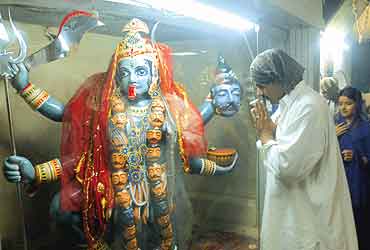
Sanjoy Ghosh
Kali idols in Karachi's posh Clifton area

Sanjoy Ghosh
Kali idols in Karachi's posh Clifton area
HINDUS IN PAKISTAN
Jai Kali Karachi Wali
They have their gods, their weddings, their businesses.
These Hindus just happen to be living in Pakistan.
MANU JOSEPH
Bani is a Gujarati lady with moist red teeth and a wicked gleam in her eye. When she's in a good mood, the ancient temple sweeper with no confirmed human master will admit to being "between sixteen and eighty years old."
She sits at the gate of the Lakshmi Narayan temple, a small impoverished shrine that stands at one end of a creek in Karachi's prime real estate. Four young girls walk to the gate. The sheer beauty of two is completely wasted on Bani, who stops the girls with a wave and asks them to leave: "Muslims aren't allowed in."
"We just want to walk around and look," one of the girls, Rumi, says.
"Then go to the zoo," retorts Bani.
To the conventional secular urban sophisticate, this may sound like the dangerous portent of violent religious conflict. But there is no malice here. The entire exchange on this breezy Karachi evening is just about a marking of territory.
The Muslim girls are far from hurt. They plead between giggles. "We just want to pray." Hirakumari, a few months pregnant and related in some complicated way to Bani, tells them, "Go pray to your god. You eat cows, make fun of our gods, ask if our gods don't feel cold, being naked..."
But she then turns and whispers with a smile, "They are actually lovely people, these Muslims. They will feed us for the rest of our lives, if it comes to that. Pakistan is the only place I call home but how can we let Muslims inside (the temple)?"
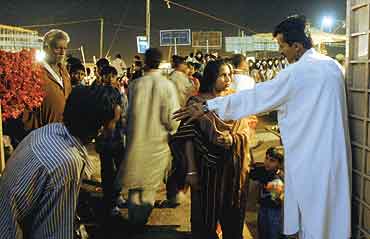
A volunteer allowing entry only to Hindus in the temple
A similar scene plays out at a crowded Shiva temple in Karachi's posh Clifton neighbourhood. It's Monday night, the busiest spell in the temple's week. Jayanti Ratna stands with a stick at the gate and screams 'Jai Shiv Shankar'. When someone doesn't respond he stops the trespasser with, "Muslims and Christians are not allowed."
Does it feel strange for a Hindu man in Pakistan to stand by a busy pavement and block local Muslims? "Not at all. I was born here. I belong here. I will exercise my right to serve my faith."
Today Pakistan's Hindus number somewhere between 2.5 million (a somewhat suspect official estimate) and 5 million (according to popular Hindu politician Kishinchand Parwani). Over 95 per cent of them live in the province of Sindh; most are poor farmers and labourers from the scheduled castes.
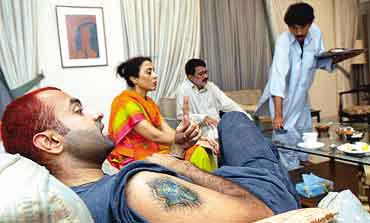
Deepak Perwani with his parents
Many of the worshippers at Karachi's temples are somewhat better off, and the calm affluence of Karachi's wealthier Hindus is worlds apart. Thirty-year-old Deepak Perwani, his hair dyed red, and a Ganesha tattooed on his right arm, is one of Pakistan's top fashion designers. His quick Indo-Pak analysis: "There is one major difference. Indians can't cut a salwar to save their lives and Pakistanis can't cut a churidar!"
As with many Hindus here, 'Inshallah' slips out of his mouth easily as a prelude to anything and he eats beef, never pork. A travel agent once booked him into a Lahore hotel as an Indian. "I was pissed off. I struck out the word Indian and wrote Pakistani." Six years ago when he wanted to open a store on an upmarket Karachi street, his friends asked him not to flaunt his name outside. But he was soon forced by market pressure to put his brand up in massive type—Deepak Perwani. "There's been no trouble, not a single incident outside my shop."
Perwani is celebrated and patronised by the rich and mighty of Pakistan, even honoured as the country's cultural ambassador to China. But he has just one "small problem" being in Pakistan.
"Mathematical chance isn't on the side of a Sindhi Hindu looking for a suitable arranged match within the small community. The girl has to be imported," Perwani says, "since I am doing too well here to be exported." His mother Renu will parade him in Bombay, Dubai and Hong Kong, but as she says with motherly concern, "People in India or Dubai don't want their daughters to live in Pakistan. It's a mindset."
Renu's endearing motherly look turns somewhat severe when she considers the options for her son, "I would never accept a Muslim girl in my house. All my friends are Muslims and I know they are very beautiful people, cultured and nice. But a daughter-in-law is a different matter." In any case, her son can't marry a Muslim; Islamic law prohibits a Muslim marrying a Hindu. "I'd have to convert," says Deepak. "And I would never do that."
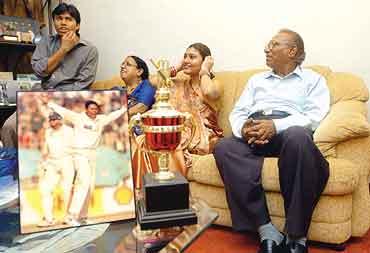
Danish Kaneria, cricketer and Hindu, his parents and wife Dharmita
In between the rich Sindhis and the poor Hindu farmers of rural Sindh is the middle-class setting of Danish Kaneria's home. The leg-spinner is only the second Hindu to play cricket for Pakistan. His new wife Dharmita is also part of the same Gujarati community. "We met at a festival," Dharmita says, almost shyly. Danish's elder brother Vikrant is engaged to Dharmita's sister, who will also live in the four-bedroom flat soon.
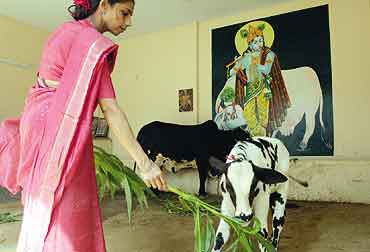
A Hindu devotee feeding a calf in the Swami Narayan temple in Karachi
Mrs Kaneria talks fondly about the temples of India, often referring to the country as "apna desh". Vikrant is surer of where he belongs. He echoes a popular belief among the elite here that life for the educated is much better in Pakistan than in India. "And there is no discrimination at all," he says. "The fact that my brother is playing for Pakistan proves that."
Kishinchand Parwani, a member of the National Assembly (equivalent to the Indian Member of Parliament) from 1988 to 1997, recalls that right up to the late '80s a steady stream of Hindus would migrate to India. "That was because of home-sickness but they soon realised that in India nobody was going to hug and welcome them just because they were Hindus from Pakistan. Hindus are safe in Pakistan but there is this fear that if anything like Babri Masjid happens, we will have to bear the brunt again. That was the only time Hindus here felt threatened."
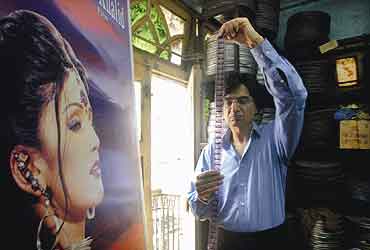
Film distributor Satish Anand (actress Juhi Chawala's uncle) has
released over 450 Pakistani films
A day after the demolition of the Babri Masjid, his staff told Satish Anand not to attend office. Anand, who is film actress Juhi Chawla's uncle and a Punjabi Hindu settled in Karachi, runs Eveready Films, which has distributed over 450 Pakistani films and a few Hindi films like Awara and Barsat. "It was the only time I felt like I was in someone else's country," he says. "After that things have been peaceful."
Yet beyond Karachi, low-caste Hindus in Sindh's small villages face a different reality. "The number of reported cases of violence against Hindus resulted in a distinct worsening in their plight over the year," says a report of the Human Rights Commission of Pakistan (HRCP). "On September 17, 2003, in broad daylight six armed persons attempted to rape three Hindu women. According to local Hindus, this was the seventeenth incident in the area in 2003."
Still, HRCP's Nadia Haroon will make a distinction between crime against Hindus and communal violence. "The attack on Hindu women is part of crime against rural women in general in Pakistan. Hindus are rarely targeted because they are Hindus but since the justice system is so slow and in some cases biased against minorities, criminals here feel that they can get away with such attacks on Hindus."
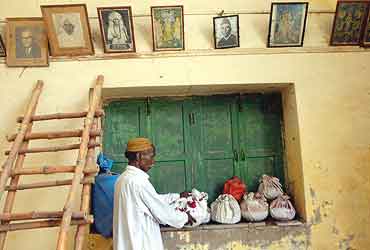
A worker at the Hindu crematorium outside Karachi with the ashes
waiting to be collected by relatives in India
On the outskirts of Karachi, near a graveyard, the Afghan taxi driver turns philosophical under the intense afternoon heat."When it all ends, Hindus and Muslims go to the same place." Here, by a Muslim graveyard is a Hindu crematorium. It has a library, though there are no books, only the ashes of Hindus who have passed on. The relatives await the visas that will let them immerse their ashes in the Ganga. In India.